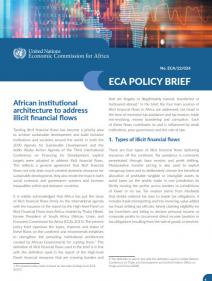Tackling illicit financial flows has become a priority area to achieve sustainable development and build inclusive institutions and societies around the world. In both the 2030 Agenda for Sustainable Development and the Addis Ababa Action Agenda of the Third International Conference on Financing for Development, explicit targets were adopted to address illicit financial flows. This reflects a general agreement that illicit financial flows not only drain much-needed domestic resources for sustainable development, they also erode the trust in both social contracts and governance systems and increase inequalities within and between countries. The present policy brief examines the types, channels and status of these flows on the continent and recommends initiatives to strengthen the prevailing institutional architecture created by African Governments for curbing them. In the brief, the four main sources of illicit financial flows in Africa are addressed: tax fraud in the form of excessive tax avoidance and tax evasion, trade mis-invoicing, money laundering and corruption. Each of these flows contributes to and is influenced by weak institutions, poor governance and the rule of law.
Share this:
Release Date:
3 November, 2022
© United Nations Economic Commission for Africa

